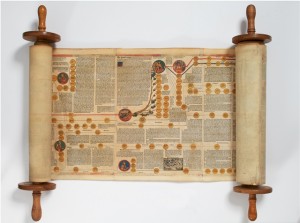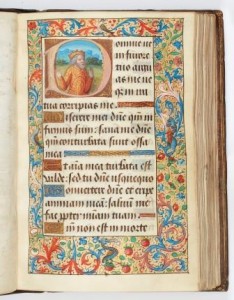A 16th century historical feast – leap into Rare Book Week by visiting the Chronicle exhibition (14th-24th July 2016)
Chronicle exhibition
The Baillieu Library is excited to announce for one week only an exclusive exhibition of recent acquisitions from the Kerry Stokes Collection, which have been generously loaned to coincide with this year’s Rare Book Week (14th-24th July 2016).
At the centrepiece is a rare 11 metre scroll printed on parchment, Cronica Cronicarum, recording the history of the world. Ninety-two woodcuts include early depictions of the cities of Paris, London and Rome as well as portraits of kings and rulers, biblical and historical scenes and genealogical tables.
The scroll is supported by a number of illuminated manuscripts on vellum from the same period with interesting provenances. Attributed to Kerver, Bourdichon, Colaud and the Master of Philippe de Gueldre, these manuscripts provide vibrant examples of exquisite decoration and rare inspirational works of devotion. The Triumph of David is a highly finished miniature of David bearing the head of Goliath attributed to Vincent Raymond, mounted in a dramatic carved Italian Renaissance frame.
The exhibition can be viewed in the Dulcie Hollyock Room, Ground Floor, Baillieu Library, University of Melbourne 10am-5pm each day. Don’t miss out! The full Melbourne Rare Book Week program is available here.
Public lectures
The event is supported by a series of public lectures featuring scholars who will share their expertise and fascinating stories about these rare and beautiful source materials. Read more and reserve your place at http://events.unimelb.edu.au/rare-book-week.
After Shakespeare exhibition
And whilst you are in the Baillieu Library, take time to visit the recently opened After Shakespeare exhibition, which brings together for the first time one of only five known Australian copies of the Second Folio of Shakespeare’s works (1632), a unique promptbook for a performance of Antony and Cleopatra at Melbourne’s Theatre Royal in 1856, and numerous production artefacts and ephemera. Find out more at http://events.unimelb.edu.au/events/6717-after-shakespeare.



Leave a Reply